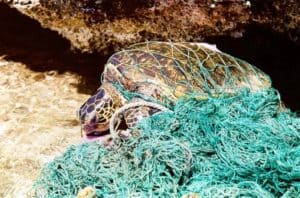Engulfed in plastic: life is at risk in the planet’s oceans
 4 September 2019
4 September 2019
Consider this: Just five countries account for most of of the plastic trash that ends up in the oceans. The five leading plastic polluters – China, Indonesia, the Philippines, Vietnam and Sri Lanka (in that order) – dump more plastic waste into the seas than the rest of the world combined.
Each year at least 8 million metric tons of plastic is dumped into the world’s oceans globally – which is enough discarded plastic to cover every coastline around the world. Every day some 8 million pieces of plastic end up in the oceans. China alone mismanages nearly 9 million tons of plastic annually with over 3.5 million tons dumped into the oceans each year.
Marine creatures large and small end up suffering the consequences.
Large: numerous whales are known to have succumbed to internal injuries caused by accidentally ingested plastic. Small: Numerous sea turtles and other animals have been discovered over the years with their necks, heads, snouts and limbs caught permanently in various pieces of plastic from plastic six-pack rings to discarded fishing nets.
Smaller still: microplastics, those tiny beads used in a variety of cosmetics and household products, have permeated much of the oceans, causing clear and present dangers to tiny fish and other sea creatures that may mistake the sand grain-size plastic globules for food. In fact, microplastics have even contaminated sea salt, including the table salt we use.
Much of the floating debris of waste plastic (which contains everything from bottles to shopping bags to wrappings to larger containers) is swept by ocean currents into the five giant gyres that have been forming for decades: In the North Atlantic, in the South Atlantic, in the North Pacific, in the South Pacific, and in the Indian Ocean.
These massive gyres of floating filth may account for a mere 5% of plastic trash in the seas: the rest might lie in wait submerged underwater where it continues to wreck marine ecosystems and strangle underwater creatures. Meanwhile, a lot of plastic is broken down into tiny microbeads that end up, hazardously, up and down food chains – so that the plastic we dump into the seas may well end up on our plates.

All this we know, but scientists have yet to understand the full extent of how all that plastic waste in the planet’s oceans is affecting aquatic environments. A lot of the discarded plastic has gone missing, leading scientists to conclude that fish and other marine animals have unwittingly been feeding on it.
“I don’t think we can conceive of the worst-case scenario, quite frankly,” warns Kara Lavender Law, an oceanographer at the Sea Education Association “We really don’t know what (all) this plastic is doing.”
And things are set to get worse before they get any better. As Asia’s developing economies continue to boom with the trappings of an up-and-coming consumerist culture, the region’s plastic consumption will likely balloon by a staggering 80%, reaching 155 million metric tons annually by 2025. That is to say, within a decade the world’s oceans might contain one ton of plastic for every three tons of fish.
To make matters worse, waste management systems across the world’s Top 5 leading polluters remain rudimentary, inefficient or nonexistent entirely. In these countries, only around 40% of garbage is properly collected; the rest is left uncollected or piled up into communal dumps from where stray bits keep being blown away by the wind or washed away by heavy rains into nearby rivers, lakes and seas.
Improving waste management systems across the five nations could reduce the amount of plastic trash by 45% within a decade, according to a study published in Science magazine. Some experts have warned that the deleterious environmental effects of plastic waste may in the long run rival those of climate change.
“This is a planetary crisis,” said Lisa Svensson, director for Ocean at UN environment. “In a few short decades since we discovered the convenience of plastics, we are ruining the ecosystem of the ocean.”
Cleaning up the world’s oceans will be a Herculean task requiring intensive international collaboration, not least among the planet’s worst polluters.
The post Engulfed in plastic: life is at risk in the planet’s oceans appeared first on Sustainability Times.
